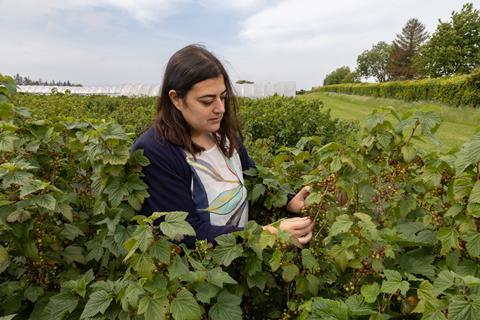Project aims to find varieties that can withstand changing climate conditions
Ribena owner Suntory Beverage & Food Great Britain and Ireland (SBF GB&I) has announced an investment of £920,000 over the next five years to continue its blackcurrant breeding programme with the James Hutton Institute (JHI).

The company said the investment will accelerate work to develop new varieties of berries that produce consistent yields in the face of climate challenges.
They will be bred to withstand extreme weather, pests and diseases while preserving the signature Ribena taste, it added.
This year saw the warmest and driest spring on record, delivering more sunshine by June 2025 than the entirety of last year, SBF GB&I noted. These conditions led to the 2025 harvest season beginning two weeks earlier than usual.
While the abundant sunshine produced strong flowering and fruit, many farms struggled with severe water stress, underlining the urgent need for blackcurrant varieties that thrive in heat as well as drought.
Key objectives
Created in partnership with SBF GB&I, the James Hutton Institute breeding programme has several core objectives which focus on delivering consistent yields, resilience and the distinct Ribena flavour profile.
By developing blackcurrant varieties that can deliver consistent yields despite environmental stress, including limited winter chilling, heat, and drought, researchers aim to support more reliable flowering and fruit set even under unpredictable weather conditions.
New field-based and laboratory tools will deliver earlier and more accurate yield forecasts, giving growers the confidence to plan around unpredictable or extreme weather events.
SBF GB&I agronomist Harriet Prosser said: “This season’s weather extremes have shown that investment in fruit varietal breeding is vital to protect the future of both the blackcurrant crop and the growers who depend on it. We look forward to working with the James Hutton Institute to make sure Ribena remains a beloved British favourite for generations to come.”
Disease resistance
The programme will also focus on resistance to pests and diseases, particularly those that significantly impact blackcurrant yields. It will prioritise cultivars that can withstand major field pests and diseases, reducing the need for chemical control.
Using molecular markers developed at the institute, resistant plants to these threats can now be identified early in the breeding process. This method is already in use, with resistant plants currently being trialled to support more sustainable blackcurrant production.
Finally, every potential berry type will undergo flavour and nutritional testing to ensure the iconic taste of Ribena is retained, while health benefits are potentially increased.
Dr Amanda Moura, soft-fruit breeder at the James Hutton Institute, said: “At the James Hutton Institute, we are strongly committed to the development of a new generation of blackcurrant varieties that can continue thriving in the UK while adapting to the challenges posed by climate change and pests’ pressures.
“This work offers greater security and long-term sustainability to our growers and to the industry. It is a great pleasure to be part of a project like this and to contribute to a fruitful future for British blackcurrant production.”



